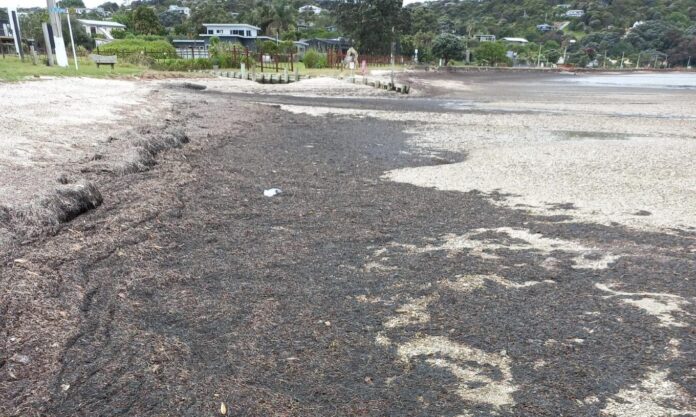Auckland Council is warning residents and visitors to Waiheke Island to avoid black algae present on two beaches on the island.
The cyanobacteria Okeania spp (previously classified as Lyngbya majuscule) has been detected on beaches at Surfdale and Blackpool on the southern coast of the island. The Council says it is the same algae that was present on the island’s coast last summer.
In a statement, the Council said laboratory testing of samples of the algae had confirmed the presence of Okeania spp and the toxin Lyngbyatoxin-A.
The Auckland Regional Public Health Service advises that the algal bloom could lead to skin, eye and respiratory irritations. The public are advised not wade in the water or touch the algal material at the affected beaches.
Auckland Council Director of Infrastructure and Environmental Services, Barry Potter said Council was monitoring the situation.
“We will continue to monitor the scale and impacts of this naturally occurring phenomena in case any further advice or intervention is required,” he said.
“We understand the public may have concerns around this news and we thank them for their patience and cooperation.”
Deputy director-general of New Zealand Food Safety (NZFS), Vincent Arbuckle said NZFS was advising the public not to consume shellfish from Surfdale and Blackpool beaches.
“Affected shellfish include bivalve shellfish such as mussels, oysters, tuatua, pipi, toheroa, cockles and scallops, as well as pūpū (cat’s eyes), Cook’s turban and kina (sea urchin). It is important to remember that cooking does not make the shellfish safe to eat. Finfish are not affected by this public health warning, but people should gut the fish and discard the liver before cooking,” he said.
The beaches where the algae is present remain open to the public but Auckland Council advises the following:
- Avoid contact with the algae, including wading in affected areas, as it could lead to skin, eye and respiratory irritation;
- If you feel unwell as a result of contact with the bloom, you should contact your doctor, or call Healthline on 0800 611 116;
- Do not gather or take algae from the beach for things like using on your garden;
- Keep dogs away from the algae and any decomposing material which could cause a reaction;
- Do not gather or consume shellfish from the affected beaches.



